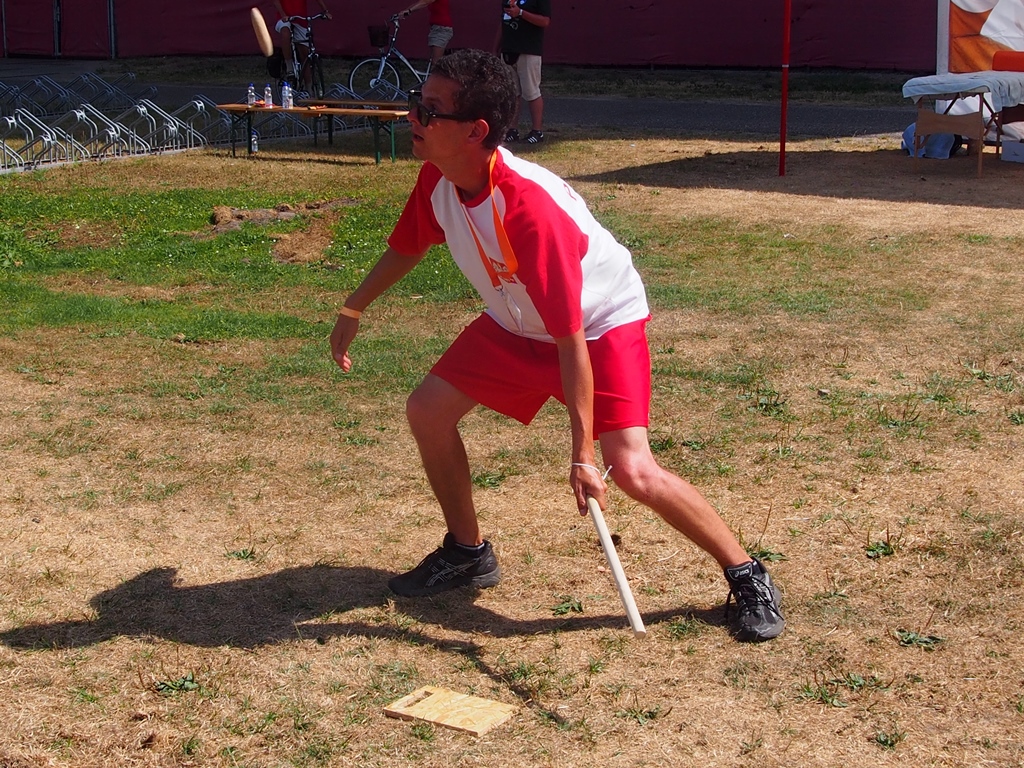
Sztekiel (Poland)
- Name of sport (game): Sztekiel
- Name in native language: Sztekiel
- Place of practice (continent, state, nation):
Poland – it used to be played in several regions of Poland, having different names, such as, among others, klipa, kiczka, pliszka, czyż or sztekiel. There are also similar games in other countries all over the world, like tip cat in England, mouilh in French Brittany, Guli Dunda in Pakistan, India or Bangladesh, pandolo in Slovenia etc.
- History:
Sztekiel belongs to a large, international family of games. It was played in Poland especially in the villages by poor youth in western Poland. It was developed into many variations. After the First World War it started to disappear. After the Second World War mass sport was popularized in Poland and most of simple, folk games as sztekiel were no longer popular.
- Description:
Sztekiel is a very simple, hitting and throwing game.
In its basic version, a player uses a flat or a rounded bat to hit a small, wooden, sharpened at both ends, stick up in the air and then he/she knocks it again forwards into the field as far as possible.
There were many regional variations of this game. In more complex versions, the game consisted of several rounds in which the points were awarded for hitting a stick further into the field than the opponent. These points were calculated in different ways. The winner was the player who scored more points in the entire game or the one who just hit the stick the furthest. - Current status:
Sztekiel is no longer a popular game. However, it has not disappeared completely.
Until fairly recently, from time to time, the competitions in sztekiel were organized, in which the graduates of the Ignacy Paderewski Secondary School in Poznań from the 1950. (called "Kadra" (the Team)) were playing, supported by the current pupils of this secondary school and the students of the Poznań University of Physical Education. The matches were played in a friendly, recreational atmosphere. They even enjoyed the interest of the regional media.
The prizes in these competitions were decoratively varnished, hand-made sticks (called in plural form “sztekle”). Sometimes you could also hear about these competitions in regional radio stations and newspapers. There is even a unique book, edited by Henryk Walendowski and his friends, entitled “The sounds of our class”. It includes an interesting column, describing sztekiel - its history, rules of the game, competition results, etc. It has a symptomatic name “szteklology”.
Sztekiel is also occasionally presented in Poland and abroad. This sport enjoyed some interest, for example, in… South Korea during the TAFISA World Sport for All Games, where in 2008 this game was shown by workers and students of the Poznań University of Physical Education.
In addition, it is also played from time to time in some museums, like the Museum of the First Piasts in Dziekanowice, Greater Poland region. - Importance (for practitioners, communities etc.):
Sztekiel as a the Post-war "game of freedom".
It may seem that sztekiel is “just a game”. However, after the Second World War, this sport was much more important, especially in many villages in Greater Poland. It was then that people raised their heads after the terrible years of war turmoil, and the game of sztekiel turned out to be one of their liberating “tools”.
The former sztekiel player and a deserved initiator and organizer of the competitions in sztekiel, the creator of the game equipment and the editor of studies devoted to it, Henryk Walendowski, told us: “For us it was a sport of freedom. In a city full of a post-war rubble, we would go to the field and play sztekiel. It was an opportunity for us to meet and have
a genuine sense of freedom after the war".
Currently, the above-mentioned matches of “the Team” are organized less frequently than in the past. Sztekiel also does not have a large range of influence in Poland. The hope lies in the younger generation that this Polish game will not be forgotten. In other countries, similar games are returning and receiving some attention. Hopefully, it will be the same for sztekiel. - Contacts:
Bartosz Prabucki, PhD, expert in traditional sports, Institute for the Development of Sport and Education.
- Sources of information :
W. Lipoński, World Sports Encyclopedia, MBI, OW ATENA, St. Paul-Poznań, 2003.
Website: https://inspirowanysportem.pl/sztekiel-ciekawa-gra-powojennego-pokolenia-polakow/ - Gallery:

